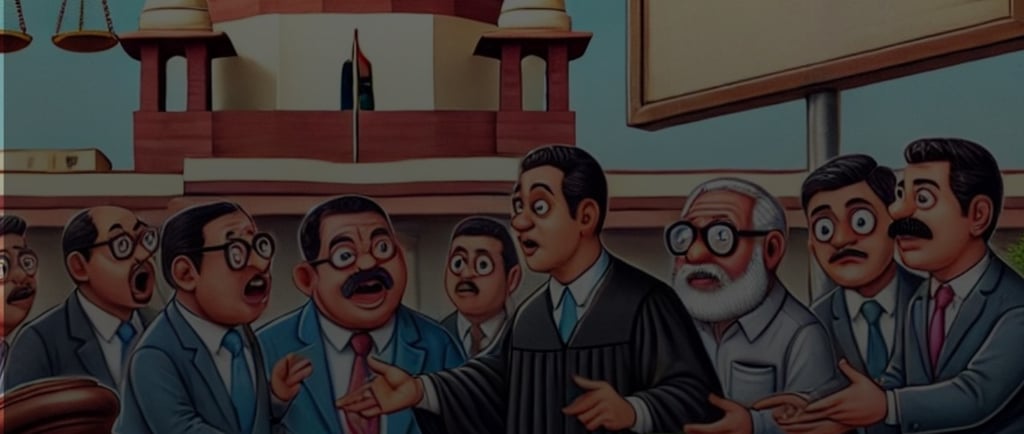Supreme Court Upholds Goa Government's Demand for Electricity Tariff Rebates Refund
New Delhi, February 14, 2025 – The Supreme Court of India has ruled against multiple ferroalloy and induction companies in their long-standing legal battle over electricity tariff rebates in Goa. The court dismissed appeals by Puja Ferro Alloys Pvt. Ltd., Karthik Alloys Ltd., Karthik Inductions Ltd., Global Ispat Ltd., and Sunrise Electromelt Ltd., upholding the Goa government’s demand for a refund of rebates granted under a rescinded notification.
2/22/20253 min read


The appeals stem from a dispute over a government notification issued on September 30, 1991, which granted a 25% rebate on electricity tariffs for industrial units in Goa for five years from the date of power connection. However, the State of Goa rescinded the rebate scheme on March 31, 1995, making units that applied for power thereafter ineligible for the benefit.
Despite the cancellation, the appellants claimed their rights to rebates had crystallized when they applied for electricity under the 1991 notification. They contended that the Goa government had reneged on its promise, which had led them to invest in the state. The companies argued that the rebates were not just incentives but binding commitments that had influenced their financial planning and operational decisions.
This litigation marks the third round of legal battles over this issue. Initially, the Bombay High Court (Goa Bench) ruled in favor of industrial units in 1999 (GR Ispat Ltd. v. Chief Electrical Engineer), concluding that the rescission of the notification only applied to new applicants after April 1995, not those already entitled to the benefit. The Supreme Court declined to interfere with this ruling in 2001, effectively granting relief to the industries at that time.
However, the legal landscape changed in 2002 when the Goa government enacted the Goa (Prohibition of Further Payments and Recovery of Rebate Benefits) Act, 2002. This law mandated that industries must refund the rebate benefits received after 1995, citing overriding public interest and financial constraints. The Supreme Court, in 2010 (Goa Glass Fibre Ltd. v. State of Goa), upheld the constitutional validity of the 2002 Act, clearing the way for the government to demand refunds from companies that had availed of the rebates.
In 2011, the Goa government issued demand notices to the appellants, seeking repayment of the rebates they had received, amounting to ₹13.63 crore from Puja Ferro Alloys alone. The companies challenged these notices in the Bombay High Court, which ruled against them in July 2011, a decision that was subsequently reaffirmed in October 2011 upon review.
Key Legal Arguments and Supreme Court Ruling
In their Supreme Court appeal, the appellant companies, led by senior advocate Santosh Paul, argued that:
Their rights to the 1991 rebate scheme had vested at the time of application for power, even if electricity supply began later.
The 2002 law was being misapplied, as their rebates were granted under the 1991 notification and not the later rescinded amendments of 1996.
The principle of promissory estoppel prevented the government from going back on its commitment to investors.
However, the Supreme Court, in a judgment authored by Justice Dipankar Datta and Justice Sandeep Mehta, rejected these arguments, reasoning that:
The 1991 notification was rescinded on March 31, 1995, and none of the companies received power supply before that date. Therefore, they could not claim benefits from a non-existent scheme.
The Goa government's financial concerns and public interest justified the withdrawal of rebates, aligning with the Supreme Court’s ruling in MRF Ltd. v. Manohar Parrikar (2010).
The principle of res judicata applied, meaning the companies could not re-litigate a matter already settled in previous cases.
The court further dismissed the review petitions, noting that no error apparent on the face of the record was found.
Implications for Industrial Policy
This ruling sets a precedent for similar cases where government incentives are withdrawn due to financial constraints. The decision underscores that industrial incentives are not absolute guarantees, particularly when legislative changes and judicial rulings validate their rescission.
With the Supreme Court upholding the Goa government’s demand for rebate recovery, the affected companies may now have to refund crores in electricity tariff rebates, further impacting their operational costs.
Conclusion
By dismissing the appeals, the Supreme Court has reaffirmed that government incentives can be subject to change based on policy shifts and public interest. The ruling reinforces the legality of retrospective recoveries under the 2002 Goa Act, signaling that companies cannot indefinitely claim past benefits under rescinded schemes.
